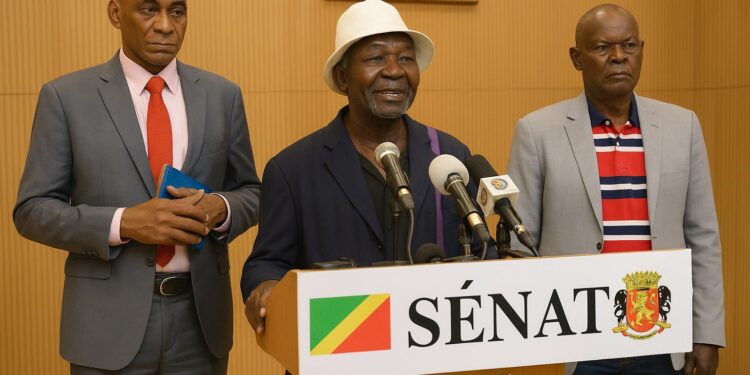Mounting Arrears Threaten Household Stability
Retired civil servants under Congo-Brazzaville’s Caisse de Retraite des Fonctionnaires (CRF) have accumulated 50 months of unpaid benefits, a backlog stretching from 2016 to projections for 2025. On 7 November in Brazzaville they turned to Senate President Pierre Ngolo for high-level mediation.
The delegation, representing the Federation of Retirees’ Associations, the Union for the Defence of Retirees’ Interests and the National Coordination of CRF Associations, requested payment of at least three months, revaluation of pensions to index 300 and expedited administrative reviews.
CRF union leader Eugène Bakoula framed the issue starkly: “What Congolese stomach can go five months without food?” His calculation places 45 unpaid months between 2016 and 2021, another two in 2024 and three projected in 2025, underscoring a deepening liquidity concern.
Senate Leadership Assumes Mediator Role
Senate President Ngolo urged calm, recalling broader fiscal strains while pledging to relay the file to the chamber’s economy and finance committee for technical vetting during the ongoing state-budget review. He reiterated that retirees, given their vulnerability, deserve particular attention within constrained national resources.
The conversation reopened a budgetary line that had existed under former finance minister Rigobert Andely, labelled “retirement complement”. According to union representatives, the provision disappeared from the 2024 and draft 2025 budgets, prompting calls for its reinstatement in the 2026 finance law now in committee.
In their 2021 approach to the Senate, the same groups contested a draft allocation of 49.9 billion CFA francs, insisting that at least 133 billion were necessary to maintain monthly flows. Following that intervention, the 2022 pension calendar was reportedly honoured without interruption.
Budget Line Debate and Macroeconomic Headwinds
Budget watchers note that CRF cash-flow gaps mirror wider treasury tensions driven by volatile oil receipts, debt-service peaks and climate-related spending pressures. The Ministry of Finance’s medium-term expenditure framework signals tight ceilings for non-prioritised outlays until hydrocarbon prices stabilise.
Yet pensions play a counter-cyclical role in local consumption. A Banque des États de l’Afrique Centrale study estimates that every 10,000 CFA francs transferred to retirees injects roughly 8,200 CFA francs into domestic demand within a quarter, supporting small traders and rural remittance chains.
For portfolio investors, delayed pensions highlight execution risk within Congo’s public financial management architecture, even as sovereign Eurobond coupons continue to be serviced on schedule. Fitch Ratings kept the Republic at B- with a stable outlook in July, citing moderate fiscal consolidation momentum.
Dialogue Over Protest: Political and Social Implications
Senate deliberations therefore attract close attention from creditors, multilaterals and private operators supplying goods to the state. A durable arrears-clearance plan could serve as precedent for settling other domestic obligations outstanding to contractors and municipalities.
Speaking after the meeting, Bakoula confirmed that a previously planned 17 November sit-in has been suspended in favour of dialogue. “The President of the Senate gave us wise advice and we will follow the institutional route until doors open,” he told reporters (Les Dépêches de Brazzaville, 8 Nov).
Ngolo complimented the unions for choosing negotiation, adding that “if the elders light the fire, what can we expect from the youth?” The remark, widely shared on local radio, underscored parliament’s concern about preserving social peace during a delicate macro-fiscal transition.
The Senate’s economy committee is expected to hold technical hearings with the Directorate-General of the Budget, the CRF management board and union auditors before the draft 2026 finance law is transmitted to the lower chamber later this month.
Funding Scenarios and Investor Perspectives
Analysts anticipate three scenarios: immediate release of a partial tranche financed through treasury bills; phased inclusion of a pension-specific vote in 2026; or bundling arrears into the domestic debt restructuring envelope currently under discussion with the IMF.
Whichever pathway is chosen, transparent milestones will be critical. Bondholders consulted by local media argue that clear arrears tables and quarterly disclosures could reduce uncertainty premiums, lighten borrowing costs and free fiscal space for the government’s climate and digital-infrastructure agendas.
For now, retirees await the Senate’s report, investors await the draft budget’s final wording, and policymakers weigh short-term cash needs against long-term credibility. All sides seem aligned on one point: safeguarding social stability remains indispensable for sustaining Congo-Brazzaville’s gradual, oil-backed economic recovery.
A senior official at the Ministry of Public Service, requesting anonymity, confirmed that biometric audits launched last year had already cleared 3,500 “double dossiers”, potentially saving 1.2 billion CFA francs annually. He argued that such savings could offset part of the pension backlog without widening the deficit.
Civil-society economists, however, caution that one-off administrative gains cannot substitute for a sustainable funding formula. They recommend ring-fencing a share of non-oil revenue growth for social protection, a strategy aligned with the government’s commitment under the Extended Credit Facility programme signed with the IMF in 2022.











































